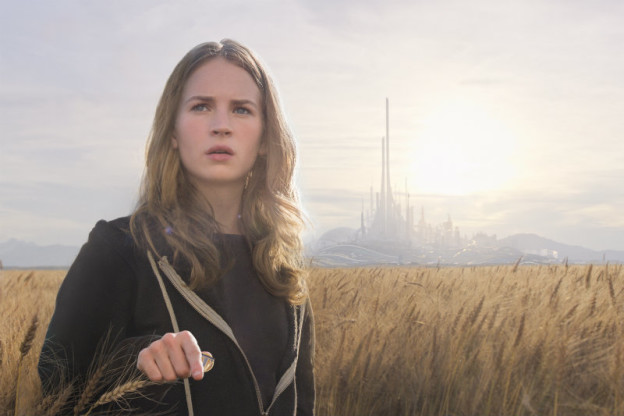By Robert Yaniz Jr.
Brad Bird has proven his skill in delivering family films that manage to combine emotional resonance, larger-than-life storytelling and unforgettable characters (we’re clearly fans). This is especially evident in his two collaborations with Pixar Animation Studios: Ratatouille and The Incredibles
. So when it was announced that the top-secret Disney project he was working on was Tomorrowland, more than a few eyebrows were raised. After all, this seemed like the perfect marriage of filmmaker and material. Why then isn’t Tomorrowland a better film?
Viewers are first introduced to a framing device wherein heroes Frank Walker (George Clooney) and Casey Newton (Britt Robertson) begin telling the story of how they met and the truth behind Tomorrowland. The film takes its time – that’s a compliment – easing viewers into the fantastical rules of this universe, as we see young Frank (Thomas Robinson, playing the Clooney role in flashback) and Casey discovering the titular world for the first time. Before long, Casey meets the very same young girl (Raffey Cassidy) who brought Frank to Tomorrowland initially, and the two embark on a mysterious quest to track down present-day Frank.
To reveal anything else would likely be considered a spoiler, but the irony here is that the plot of Tomorrowland is actually its weakest point. Early on, the film has a real sense of wonder about them, as its two protagonists separately encounter the film’s lively visuals (keep an eye out for Tomorrowland’s swimming pools). These moments – and a handful of heart-stopping action sequences that call to mind some of the old-school adventure films of the 1980s – easily convey the tone the film intended to maintain throughout.
Moreover, Robertson and Clooney are effective leads, with the former coming off more convincing in her optimistic role than the latter is in his curmudgeonly one. Considering the heavy-handed message at the heart of Tomorrowland, it really does hinge on whether or not viewers buy Robertson’s character, who essentially serves as a walking, talking embodiment of the ideal to keep hope and imagination alive in the face of dark times.
Even so, Cassidy is hands-down the standout here. As the ageless Athena, she represents the emotional core of the film and its crowd-pleasing character, dominating a number of the most satisfying action and comedic moments with ease. Hers also ends up being one of the clearest character motivations, and it ultimately her that pushes forward the plot the most, even if the details surrounding her backstory seem a bit at odds with the story it’s trying to tell.
Despite its tenuous at best connections with the Disneyworld attraction that bears its name (beyond the opening sequence), Tomorrowland captures the theme that is central to many Walt Disney projects. Along the way, it even makes some thought-provoking points about our apocalypse-obsessed culture and the lost desire to dream of something bigger than today. Unfortunately, that imagination appears only intermittently in the actual film, which does an admirable job setting up a central mystery and a wondrous place that ultimately rings hollow and lands without any payoff to the intriguing questions it poses. Those fans searching for someone to blame will likely lay that hate onto writer Damon Lindelof, who faced similar issues as showrunner on ABC’s Lost and screenwriter on Ridley Scott’s Prometheus
.
For children small enough to overlook the film’s numerous flaws (and big enough to appreciate its ambitious themes), Tomorrowland is a great ride. However, it still feels like a prototype to a truly great movie that might have been.


